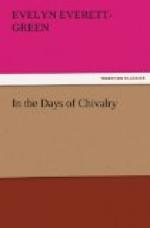John’s face was illumined by a strange radiance. It seemed to Raymond as though something of the spirit of the Knight of the Grail shone out from those hollow eyes. A subtle sympathy fired his own soul, and taking his cousin’s thin hand in his he cried quickly and impetuously:
“Such a knight as that would I fain be. Good John, tell me, I pray thee, where such a quest may be found.”
At that literal question, put with an air of the most impulsive good faith, John’s face slightly changed. The rapt look faded from his eyes, and a reflective smile took its place, as the young man gazed long and earnestly into the bright face of the eager boy.
“Why shouldst thou come to me to know, good lad?” he questioned. “It is of others that thou wilt learn these matters better than of me. Do they not call me the man of books — of dreams — of fancies?”
“I know not and I care not,” answered Raymond impetuously. “It is of thee and of thee only that I would learn.”
“And I scarce know how to answer thee,” replied the youth, “though gladly would I help thee to fuller, clearer knowledge if I knew how. I trow that many men would smile at me were I to put my thoughts into words, for it seems to me that for us who call ourselves after the sacred name of Christ there can be no higher or holier service than the service in which He himself embarked, and bid His followers do likewise — feeding the hungry, ministering to the sick, cheering the desolate, binding up the broken heart, being eyes to the blind and feet to the lame. He that would be the greatest, let him be the servant of all. Those were His own words. Yet how little do we think of them now.”
Raymond sat silent and amazed. Formerly such words would have seemed comprehensible enough to him; but of late he had seen life under vastly different aspects than any he had known in his quiet village home. The great ones of the earth did not teach men thus to think or speak. Not to serve but to rule was the aim and object of life.
“Wouldst have me enter the cloister, then?” he asked, a look of distaste and shrinking upon his face; for the quiet, colourless life (as it seemed to him) of those who entered the service of the Church was little to the taste of the ardent boy. But John’s answer was a bright smile and a decided negative; whereupon Raymond breathed more freely.
“Nay; I trow we have priests and monks enow, holy and pious men as they are. It has often been asked of me if I will not follow in the steps of my good uncle here; but I have never felt the wish. It seems to me that the habit of the monk or the cassock of the priest too often seems to separate betwixt him and his fellow man, and that it were not good for the world for all its holiest men to don that habit and divide themselves from their brethren. Sir Galahad’s spotless heart beat beneath his silver armour. Would he have been to story and romance the star and pattern he now is had he donned the monkish vesture and turned his armed quest into a friar’s pilgrimage?”




